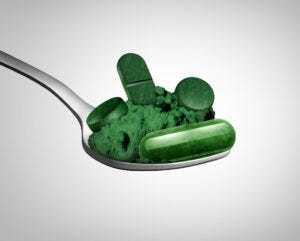Content Spotlight
Podcast: MilliporeSigma says education vital to creating unbreakable chain for sustainability
MilliporeSigma discusses the importance of people, education, and the benefits of embracing discomfort to bolster sustainability efforts.
We sit down with Lumen Biosciences CEO Brian Finrow to discuss how his company hopes to use its spirulina-based platform to develop drugs targeting gastrointestinal disorders.
Lumen Biosciences is a biotech looking to unlock the full potential of biologic drugs, whose promise has been held back by the lack of scalable technology.
The firm is developing ‘oral antibodies’ using its platform based on spirulina– the protein-rich cyanobacteria touted by many health enthusiasts as a ‘superfood’ – to create tiny factories that churn out therapeutic antibodies.

Image: Stock Photo Secrets
More details can be found in the text box below, but as part of the BioProcess International Theater at BIO in San Diego last month, I spoke with CEO and co-founder Brian Finrow.
Listen to the full interview as part of the Bioprocess Insider Expression Platform podcast here, on Apple, Amazon, Spotify, or wherever you get your podcasts.
Spirulina-based biologics Engineering a food product to produce a biologic drug is not a new idea. Earlier efforts failed, mostly because it’s hard to produce enough of the biologic. If a patient must eat the equivalent of an acre of a crop a day to receive therapeutic benefit, it’s just not feasible as a drug. Spirulina has been grown at scale in the US since the 1970s, which means that it has a long track record and plenty of safety data. Furthermore, sprirulina is packed with protein so a little sprinkle goes a long way. The biggest challenge is figuring out a way to make those protein stores therapeutic. Antibodies are proteins. Lumen gets spirulina to produce them by engineering the cyanobacteria’s genome. But the company doesn’t use CRISPR or some other gene-editing technique, which would only make antibody production more complex and more expensive. The Lumen technology takes a gene that codes for a desired protein and inserts it into one or more designated locations in the spirulina genome. As spirulina grow and divide, they make the antibodies and pack them inside their cell membranes. Engineering also controls how much of a desired protein is produced in each cell. Spirulina only need water and light to grow. The spirulina that’s sold by grocers and health food stores is grown in outdoor ponds, then dried. Lumen produces its spirulina much the same way, though it does so in a controlled 20,000 square-foot-indoor facility in Seattle’s Fremont neighborhood. The end product is a greenish powder of dead, desiccated cells. Traveler’s diarrhea is Lumen’s lead disease target. The company aims to prevent the condition from developing in the first place. The Lumen drug, a capsule filled with the green powder, is intended to be taken by a traveler once a day. In the gut, the cell membrane breaks down, releasing its antibody payload. Those antibodies stand ready to bind to and neutralize toxic bacteria they encounter. The antibodies and pathogens are then swept from the gastrointestinal tract with bodily waste. In Phase I testing, the drug candidate was shown to be safe and well tolerated by patients. Lumen’s pipeline also includes candidates for norovirus and Clostridioides difficile infection, both of which the company aims to neutralize in the gut. There are no FDA-approved norovirus therapies or vaccines. |
You May Also Like